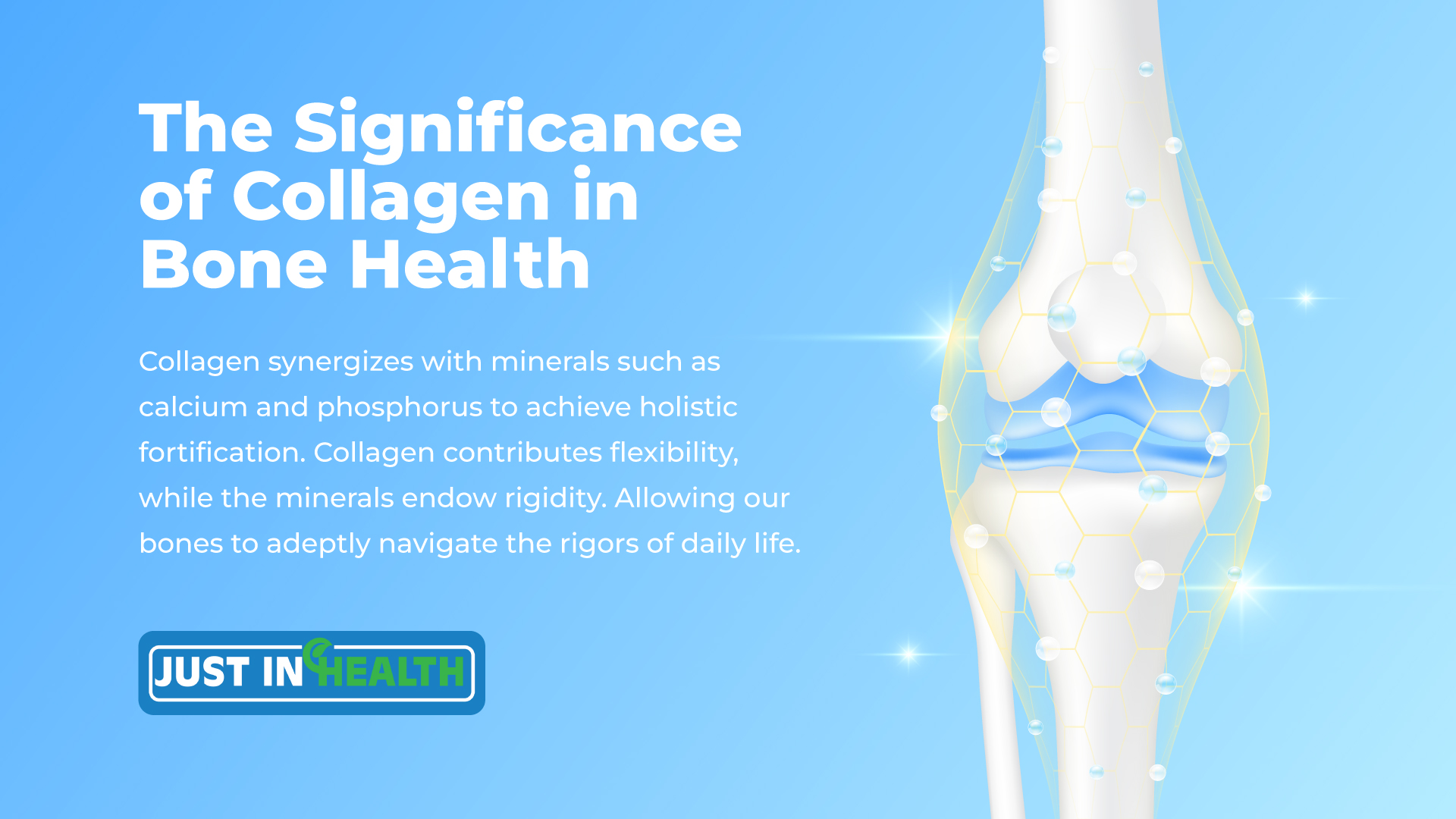
Specific proteins play pivotal roles in pursuing optimal health and rejuvenating our body's natural functions. Among these, collagen stands out as a true marvel of nature. As the most abundant protein in the human body, collagen makes up about 70% of our total protein content. But what exactly is collagen, and why is it crucial for our overall well-being?
Let’s embark on a journey to uncover the incredible benefits of this remarkable protein and understand how it can enhance everything from gut health to bone strength.
Often called “Nature's Architecture,” collagen is a fundamental component of biological structures across numerous species. To truly grasp its importance, imagine the foundation of a majestic skyscraper – robust, solid, and integral to supporting the entire structure. This analogy aptly illustrates the role of collagen and its unique triple helix structure within our bodies.
Collagen facilitates the elasticity of our skin, allowing it to stretch and return to its original form. It provides flexibility to our tendons, preventing them from rupturing under stress. Moreover, collagen isn't exclusive to humans; it's ubiquitous throughout the animal kingdom, from microscopic organisms to the formidable blue whale, underscoring its evolutionary significance.
However, there's a catch – the human body doesn't easily digest raw collagen. It's akin to trying to chew leather, which is why consuming collagen in its natural state isn't particularly beneficial. Fortunately, scientific advancements have yielded methods to transform collagen into a more assimilable form, known as hydrolyzed collagen or collagen peptides. This modification enables easier absorption, allowing the body to reap the myriad benefits of collagen.
For those looking to incorporate collagen into their diet, options abound. Whether one opts for a nourishing cup of bone broth or integrates a collagen supplement into a morning smoothie, such choices offer palatable and efficacious means to harness the power of this vital protein.

When discussing overall well-being, it's impossible to overlook the importance of gut health. Often referred to as the body's “second brain,” the gut plays a crucial role in our overall health, and collagen's function within this domain is remarkably significant.
Glycine, a pivotal component of collagen, manifests notable health advantages. It operates like a mediator within the gut by mitigating inflammation and optimizing functionality. However, glycine doesn't work in isolation; it collaborates with its counterparts, proline, and hydroxyproline—United, and functions like a restoration team, ameliorating damage and fortifying the gut lining.
This dynamic triad plays an integral role in safeguarding against the permeation of deleterious substances into the bloodstream, a condition often referred to as “leaky gut syndrome.” By maintaining the integrity of the intestinal barrier, collagen helps prevent undigested food particles and toxins from entering the bloodstream, which could otherwise trigger inflammatory responses throughout the body.
Equally essential is the role of beneficial gut bacteria, a vibrant community instrumental in maintaining digestive equilibrium. Collagen emerges as a significant ally to these bacteria. By attenuating inflammation within the gut, collagen fosters a conducive habitat, enabling the flourishing of this microbial population. This relationship can be likened to the meticulous cultivation of a garden, where optimizing soil conditions is paramount for plant growth.
Additionally, collagen may enhance the efficacy of our digestive enzymes, thereby facilitating a more efficient breakdown of our nutritional intake. This improved digestion can lead to better nutrient absorption, potentially reducing issues like bloating and discomfort after meals.
Venturing into the realm of bone health reveals another fascinating aspect of collagen's importance. Contrary to the static and inanimate skeletons encountered in biology laboratories, our bones are dynamic structures, perpetually undergoing reshaping and renewal. This process can be likened to a symphony of life, and collagen is integral to this harmonious dance.
When collagen synergizes with minerals such as calcium and phosphorus, the result is akin to a meticulously choreographed ballet. Collagen contributes flexibility, while the minerals endow rigidity. In tandem, they establish equilibrium, fortifying our bones to adeptly navigate the rigors of daily life.
Collagen forms the scaffold upon which mineral crystals deposit, creating bone's firm yet flexible structure. Without adequate collagen, bones can become brittle and more susceptible to fractures. Furthermore, a diet abundant in collagen has the potential to enhance this harmonious interplay, thereby potentially mitigating the risk of debilitating conditions such as osteoporosis.
As we age, our bodies naturally produce less collagen, which can decrease bone density. This is one reason why older adults are more prone to fractures and osteoporosis. By supplementing with collagen, we may be able to support bone health and maintain bone density as we age.

While the roles of collagen in gut and bone health are impressive, the benefits of this protein and its constituent amino acid, glycine, extend far beyond these areas:
Enhancing Sleep and Relaxation:
Glycine, integral to collagen's composition, enhances sleep quality. It influences the central nervous system and is thought to reduce the body's core temperature, thereby facilitating sleep onset. Moreover, glycine's impact is not limited to inducing sleep but extends to fostering a more profound, restorative slumber, contributing to overall well-being.
Research has shown that glycine may help reduce the time it takes to fall asleep, improve sleep efficiency, and enhance subjective sleep quality. For those struggling with insomnia or poor sleep quality, collagen supplementation might offer a natural solution to improve rest and recovery.
Promoting Skin Vitality:
Collagen has garnered acclaim as the ‘fountain of youth' amongst skincare enthusiasts and professionals. It is pivotal in maintaining skin elasticity and hydration, which are fundamental for a radiant complexion. As the aging process ensues, the body experiences a decline in collagen production, manifested in wrinkles and sagging skin.
Supplementing with collagen promises to mitigate these signs of aging, revitalize the skin, and bestow a youthful appearance. Collagen helps maintain the skin's structural integrity, keeping it firm and supple. It also plays a role in wound healing and may help reduce the appearance of scars.
Augmenting Joint Function:
Joints, the pivotal points of articulation where bones intersect, necessitate meticulous care to ensure optimal functionality. Collagen is crucial in sustaining joint smoothness and lubrication, alleviating joint discomfort, and promoting enhanced mobility.
The cartilage that cushions our joints is rich in collagen. As we age and our natural collagen production decreases, this cartilage can wear down, leading to joint pain and osteoarthritis. Adding collagen to your supplementation routine can contribute to maintaining joint health, offering a preventive approach to potential degenerative joint issues.
Supporting Muscle Growth and Recovery: While often overlooked in favor of other proteins like whey, collagen plays a significant role in muscle health. Glycine, one of the primary amino acids in collagen, synthesizes creatine, which is crucial for muscle energy and growth.
Moreover, collagen contains arginine, an amino acid necessary for synthesizing nitric oxide. Nitric oxide helps dilate blood vessels and improve blood flow to muscles during exercise, potentially enhancing performance and recovery.
Promoting Cardiovascular Health: Recent research has begun to uncover collagen's potential benefits for heart health. Collagen provides structure to our arteries, the blood vessels that carry blood from the heart to the rest of the body. Without sufficient collagen, arteries may become weak.
Some studies suggest that collagen supplementation might help reduce artery stiffness and increase ‘good' HDL cholesterol levels, which are essential to cardiovascular health.
Supporting Hair and Nail Growth: Collagen is a key component of hair and nails. As we age and collagen production naturally decreases, many people notice their hair thinning and their nails becoming brittle. Supplementing with collagen may help strengthen hair and nails, promoting growth and reducing breakage.
The myriad benefits of glycine and collagen underscore their significance in maintaining and enhancing various aspects of human health, ranging from sleep quality and skin vitality to joint functionality. Incorporating these compounds into one's wellness regimen can yield appreciable positive effects, contributing to a holistic approach to health.
Collagen is more than just a buzzword in health and wellness circles; it's a foundational protein with far-reaching benefits. From maintaining gut health and supporting bone structure to promoting sleep and ensuring youthful skin, the advantages of collagen are manifold. By understanding its importance and incorporating it into our daily routine, we can harness its power and promote optimal health and well-being.
However, it's crucial to remember that while collagen supplementation can be beneficial, it's not a magic cure-all. A balanced diet, regular exercise, adequate sleep, and overall healthy lifestyle choices are all crucial factors in maintaining good health. Moreover, individual responses to collagen supplementation can vary, and what works for one person may not work the same way for another.
As with any significant change to your diet or supplement regimen, it's always wise to consult a healthcare professional before starting collagen supplementation. They can provide personalized advice based on your health status and needs, ensuring you make the best choices for your body.
In conclusion, collagen is a testament to the intricate and brilliant design of the human body. As we unravel its mysteries and harness its potential, we open new avenues for enhancing our health and quality of life. Whether through dietary sources or supplements, integrating collagen into our health routines may be a step towards a more vibrant, healthy future.
1. How long does it take to see results from collagen supplements?
Most people notice visible skin, hair, and nails improvements within 4 to 8 weeks. Joint and bone benefits may take 3 to 6 months.
2. Can collagen help with weight loss?
Collagen supports metabolism and can help with satiety, reducing overall calorie intake.
3. Are there any side effects of taking collagen?
Collagen is generally safe, but some may initially experience mild bloating or digestive discomfort.
4. Can vegetarians take collagen?
Most collagen supplements are animal-derived. However, plant-based alternatives contain collagen-boosting nutrients like amino acids and vitamin C.
5. What is the best time to take collagen?
Collagen can be taken anytime, but for best absorption, it is recommended to consume it on an empty stomach or before bedtime.
====================
Recommended Products:
TRUCOLLAGEN (Grassfed): https://justinhealth.com/products/trucollagen
TruKeto Collagen: https://justinhealth.com/products/truketo-collagen
Magnesium Supreme: https://justinhealth.com/products/magnesium-supreme
References: